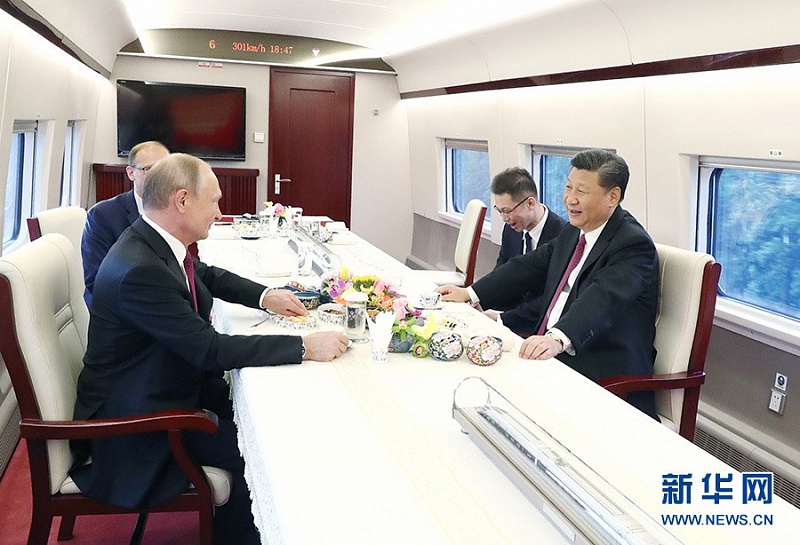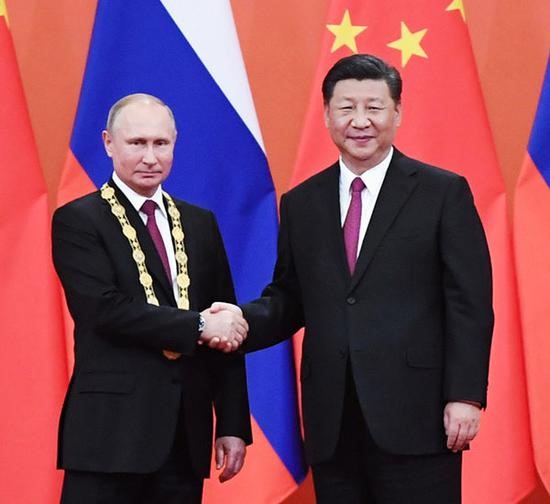The highlights of President Putin's visit to China and Sino-Russian relations
In
Log in if you are already registered
"The recent President Putin's visit to China was absolutely successful and fruitful. It has given an impetus for the further development of Sino-Russian relations," said the Chinese Foreign Ministry's spokesman Geng Shuang in the regular press conference on June 11, 2018.
This was Putin's 19th visit to China, which was also his first official state visit after he was re-elected on his fourth term in the Kremlin. During the three-day visit to China, President Xi and President Putin held negotiations and signed a joint declaration and a number of bilateral documents, which are aimed at deepening cooperation in all areas between the two countries. As a part of President Putin's trip, he also attended the Shanghai Cooperation Organization (SCO) summit in China's eastern port city Qingdao, took China's high-speed rail train to Tianjin to see a youth hockey game and was awarded China's first ever Friendship Medal by President Xi. The core information that they wanted to convey to the world is that China and Russia are strengthening their ties in different areas.
The SCO summit in Qingdao
Putin attended the 18th summit of the SCO in the seaside city of Qingdao, China. It was the first SCO summit since India and Pakistan were accepted as full-fledged members of the Organization in June 2017. President Xi Jinping said at the opening of the summit that the SCO had become stronger after the expansion and would take its responsibility to ensure the regional security and development. Putin also said at the opening that the priority of the SCO should be maintaining regional stability by enhancing cooperation in countering terrorism, separatism, and extremism. Compared with the G7 meeting, the SCO summit was more conducive to cooperation among the member states.
The SCO summit and the G7 meeting occurred at the same time; however, they unfolded in different ways. While the G7 meeting exposed the already existing cracks between the US and the other 6 top economies and displayed the divergence in their shared values, e.g., liberal trade, the SCO summit focused on deeper cooperation to resolve regional security problems and ensure common economic interests of the SCO states. It cannot be said that the summit has achieved a perfect convergence of all the interests among the members, but the obvious different vibes of the two meetings showed that the West is breaking down while the East is consolidating [7].
More importantly, the SCO summit served as a vital platform for better implementation of the integration initiatives that China and Russia are working on. The SCO shares the same values with China's Belt and Road Initiative and Russia's Greater Eurasian Partnership. These regional integration initiatives might co-exist and cover greater regions to support the joint development of participating countries.
High-speed train

Another special arrangement for Putin's visit to China was riding China's high-speed train. On June 8, 2018, President Putin left Beijing for Tianjin with President Xi on a high-speed train. It was an opportunity for President Xi to demonstrate the advantages of high-speed transport in general and China's high-speed rail technology in particular, as well as a chance for Putin to estimate China's achievements in the field. The day before the high-speed rail trip, Putin said in a live Q&A session that Russia expects cooperation with China in developing a high-speed rail system. China has shown its interests in building the first part of a high-speed rail link which could finally extend to Beijing. During Putin's visit, he mentioned that Russia is in a dialogue with China so as to push forward the construction of Moscow –Kazan high-speed rail link, which is expected to connect Beijing with Moscow in the future and thus facilitate regional economic.
Awarded the friendship medal

One of the highlights of Putin's visit to China was that he was awarded the China's first ever Friendship Medal at the Great Hall of the People in Beijing on June 8, 2018. It was the first time that the friendship medal has been awarded since China established its honor system in July 2017. President Xi Jinping conferred this friendship medal, which represents the highest honor of China to foreigners, upon his Russian counterpart and called him an intimate friend and the most amiable foreign leader to Chinese citizens. Putin also mentioned in an interview that President Xi is approachable and sincere. "President Xi is the first foreign leader who celebrated my birthday with me. We had a shot of vodka and sausage together." The friendship medal not only reflects personal friendship between the two leaders but also shows the partnership between Beijing and Moscow. It reflects the priority of Russia in China's foreign policy as well as China's values in developing its diplomatic relations.
The friendship medal symbolizes that China and Russia are strengthening their ties amid diplomatic and economic challenges from the US. China and Russia, labeled as rivals who threaten the US interests and its values, have maintained the stable relations and will continue deepening their cooperation in a variety of areas. China is always emphasizing it is endeavoring to develop foreign relations with communication, not confrontation, and with partnership, not alliance. President Xi described Sino-Russian relations as a strategic partnership during Putin's visit.
The medal underscores China's values in its diplomatic policy. China is following a path of peaceful development and working to build a community with shared future for mankind, not a zero-sum game. China hopes to convey to the world that Russia, as the major power in the world and China' s like-minded neighbor, will be the priority in China's framework for major country relations featuring overall stability and balanced development.
It was not a surprise that the first friendship medal would be awarded to President Putin. Besides the already close Beijing –Moscow partnership, Washington’s actions have further tightened their ties. As has been mentioned, China along with Russia are defined as the US's rivals, which constitute threats to its power, interests, influence, and security. The new dimension of China –US rivalry is reflected in both trade and strategic fronts. Besides the US tactics on peninsular tensions that reduced China’s leverage in the region and the Taiwan issue that complicated the cross-strait relations, Trump has begun to focus on the trade front, which has unfolded in early 2018 and is reflected in the ongoing in the present trade war. Moscow is also at odds with Washington since the West has imposed a wave of sanctions on Russian after the Crimea crisis of 2014. Increasingly, Washington has expanded the tensions and imposed more threats on both Beijing and Moscow, which will definitely cement their ties.
President Putin's visit implies Beijing and Moscow strengthening their strategic partnership, but the relations will not shift to the alliance. This is not just because China regards non-alliance as the axis for its diplomatic policy. Beijing knows well that alliance would lead to less favorable external environment [19]. Besides, at this point, China still holds close economic ties with the US. For China and Russia, the external environment promotes their strategic partnership; and Putin's visit to China responded to the world: they are deepening their political relations as well as flouring their economic ties.




